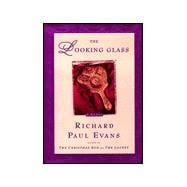When I started to write The Looking Glass, I intended to create a story about the healing power of hope and love. But as this story developed, a message began to emerge that I had not foreseen, a message about the distorted mirror in which we vi

Note: Supplemental materials are not guaranteed with Rental or Used book purchases.
Purchase Benefits
What is included with this book?
When I started to write The Looking Glass, I intended to create a story about the healing power of hope and love. But as this story developed, a message began to emerge that I had not foreseen, a message about the distorted mirror in which we vi
Please send correspondence to Richard Paul Evans at: P.O. Box 1416 Salt Lake City, UT 84110
or visit his Web site at: http://www.richardpaulevans.com
Richard Paul Evans is a nationally acclaimed speaker. To request Mr. Evans for speaking engagements, please fax your request to (801) 532-6358 or contact the above address or Web site.
Contents
Prologue
One: Quaye
Two: Hunter Bell
Three: Isabel
Four: Samson and Delilah
Five: Flight
Six: The Wax Woman
Seven: The House of God
Eight: Eureka
Nine: The Great Salt Lake City
Ten: Sonny Chang
Eleven: Quaye?s Arrival
Twelve: Jak Morse
Thirteen: The Woman in the Snow
Fourteen: The Stranger
Fifteen: The Preacher?s Soul
Sixteen: Syau Lou
Seventeen: The Abduction
Eighteen: The Inscription
Nineteen: The Burial
Twenty: The Funeral
Twenty-one: A Glass Darkly
Twenty-two: Hunter?s Absence
Twenty-three: The Looking Glass
Twenty-four: Broken Glass
Twenty-five: News
Twenty-six: Three of a Kind
Twenty-seven: Quaye?s Choice
Twenty-eight: The Lynching
Twenty-nine: Farewell
Thirty: The Redemption
Epilogue
The New copy of this book will include any supplemental materials advertised. Please check the title of the book to determine if it should include any access cards, study guides, lab manuals, CDs, etc.
The Used, Rental and eBook copies of this book are not guaranteed to include any supplemental materials. Typically, only the book itself is included. This is true even if the title states it includes any access cards, study guides, lab manuals, CDs, etc.